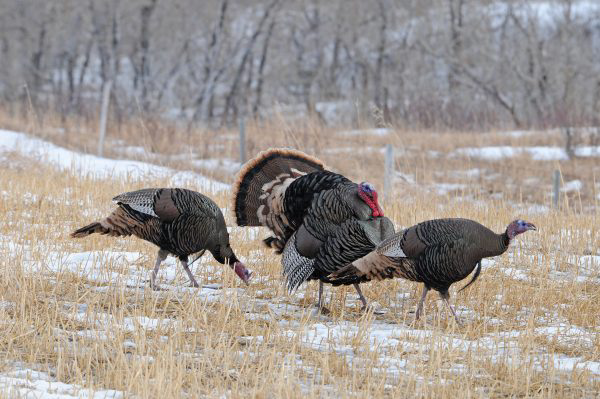
Mosquito Joe highlights how turkeys provide natural tick prevention.
|
With Thanksgiving approaching, you may be thinking more about turkeys than you normally do. And all this thinking about turkeys may have you wondering, “do turkeys eat ticks?”. You can’t find anything about the topic on social media and none of your friends seems to know for sure. Well, don’t worry, we have the answer.
The answer to this burning question is, YES! Turkeys do eat ticks! Their sharp eyesight and acute hearing make them talented tick gobblers. Both domesticated turkeys and all five subspecies of wild turkeys in the U.S. eat ticks and a cornucopia of other problematic insects. For that, we are truly thankful.
Learn just what a turkey can do with their practiced pecks.
How Many Ticks Do Turkeys Eat in One Day?
A single, full-grown turkey can consume 200 or more ticks per day, under the right conditions. A female turkey can raise a clutch of 4 to 17 poults every year, which means after one year of reproduction, her turkey family (two generations, including her and her mate) could eat up to 3,800 ticks per day, altogether. That’s way more ticks than most other birds consume. All of this gobbling up of ticks helps keep the population from getting too out of control, which can help reduce the spread of tick-borne diseases.
Can wild turkeys control the tick population?
Wild turkeys can be beneficial because they eat ticks that are on the ground, in the grass, in low vegetation and even ones on their own bodies during self-grooming. Even though these birds are also tick hosts (i.e., ticks latch onto them), they tend to eliminate more ticks than they spread.
Turkeys also eat other bugs, mollusks, and small creatures that can be irritating to humans and/or harmful to gardens. These include slugs, stink bugs, grasshoppers, snails, beetles, caterpillars, and small snakes. They also eat praying mantises, which are tick-eaters themselves—but turkeys are better at tick control than any bug ever could be (sorry, praying mantises).
If you’re interested in attracting wild turkeys to your property, there are several ways to do it. For example, you can create areas for dust baths, scatter food (like cracked corn) on the ground, and create protected nesting sites. Just keep in mind that turkeys will undoubtedly gobble up all your birdseed in the process. They can even be aggressive during mating season.
Related Topic: Control by Predators: What Animals Eat Ticks?
Other Birds That Eat Ticks
All this talking turkey may have you wondering if there are any other birds that eat ticks? Yes, many!
Here are some other feathered friends known for having ticks on their menu:
- Chickens
- Guinea fowl
- Peafowl
- Ducks
- Quails
- Partridges
- Woodpeckers
- Egrets
- Oxpecker (endemic to Africa)
These birds are known to seek out ticks as a favored food source. They could be considered true tick predators—especially the oxpecker !
However, there are many other birds that eat ticks less frequently. Many will eat a tick if they come across one when foraging, so they are not considered true tick predators, like the turkey. Numerous ground-dwelling birds, including smaller songbirds, also fit this description.
The Battle Against Tick-Borne Illnesses
Although turkeys and other birds certainly do their part to control the tick population in many areas, they can’t be counted on to do it all. And with tick populations—as well as Lyme disease cases —increasing in many areas of the country due to climate change, it is important to take the job of tick control into your own hands.
The pros at Mosquito Joe are experts when it comes to controlling pest populations like mosquitoes and ticks. We provide top-notch tick control services that help protect you, your family, and your pets from ticks and Lyme disease. To learn more about our natural barrier sprays or to schedule an appointment call or visit us online today !
